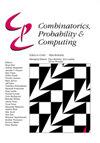Abelian groups from random hypergraphs
IF 0.8
4区 数学
Q3 COMPUTER SCIENCE, THEORY & METHODS
引用次数: 0
Abstract
Abstract For a $k$ -uniform hypergraph $\mathcal{H}$ on vertex set $\{1, \ldots, n\}$ we associate a particular signed incidence matrix $M(\mathcal{H})$ over the integers. For $\mathcal{H} \sim \mathcal{H}_k(n, p)$ an Erdős–Rényi random $k$ -uniform hypergraph, ${\mathrm{coker}}(M(\mathcal{H}))$ is then a model for random abelian groups. Motivated by conjectures from the study of random simplicial complexes we show that for $p = \omega (1/n^{k - 1})$ , ${\mathrm{coker}}(M(\mathcal{H}))$ is torsion-free.随机超图中的阿贝尔群
摘要对于顶点集$\{1, \ldots, n\}$上的一个$k$ -一致超图$\mathcal{H}$,我们在整数上关联了一个特殊的有符号关联矩阵$M(\mathcal{H})$。对于$\mathcal{H} \sim \mathcal{H}_k(n, p)$和Erdős-Rényi随机$k$ -均匀超图,${\mathrm{coker}}(M(\mathcal{H}))$是随机阿贝尔群的模型。从随机简单复合体的研究推测的动机,我们表明,对于$p = \omega (1/n^{k - 1})$, ${\mathrm{coker}}(M(\mathcal{H}))$是无扭转。
本文章由计算机程序翻译,如有差异,请以英文原文为准。
求助全文
约1分钟内获得全文
求助全文
来源期刊

Combinatorics, Probability & Computing
数学-计算机:理论方法
CiteScore
2.40
自引率
11.10%
发文量
33
审稿时长
6-12 weeks
期刊介绍:
Published bimonthly, Combinatorics, Probability & Computing is devoted to the three areas of combinatorics, probability theory and theoretical computer science. Topics covered include classical and algebraic graph theory, extremal set theory, matroid theory, probabilistic methods and random combinatorial structures; combinatorial probability and limit theorems for random combinatorial structures; the theory of algorithms (including complexity theory), randomised algorithms, probabilistic analysis of algorithms, computational learning theory and optimisation.
 求助内容:
求助内容: 应助结果提醒方式:
应助结果提醒方式:


